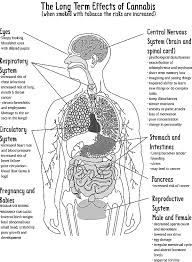What We Know about the Long Term Effects of Marijuana
Marijuana is a controversial drug that some believe is a medical miracle and others believe should be illegal and has no medical value at all. According to NIDA, “two states have legalized marijuana for adult recreational use, and 21 states have passed laws allowing its use as a treatment for certain medical conditions”.
Marijuana can be smoked or ingested and has calming effects. It helps to reduce stress levels and anxiety, however long term use can lead to tolerance and studies are strongly showing that just like any other drug, marijuana can have addictive qualities and long term effects even if prescribed for a legitimate medical reason. Here are some of the things we know about the long term use of marijuana.
Long Term Effects of Marijuana

Marijuana has many long-term effects on a person’s health and well-being.
Studies show that over 7 million people use marijuana on a daily basis and that number is growing by the day. Marijuana is the most widely used illegal drug in the United States and more and more people are dealing with the long term effects of it’s use.
Because it most often smoked, it can lead to respiratory problems like asthma, bronchitis and COPD (Chronic Obstructive Pulmonary Disorder) and even lung cancer. People who smoke marijuana on a daily basis usually form their lives around it’s use as many of marijuana’s long term effects are psychological and the craving and desire to use it can be very strong. A regular marijuana user may not recognize that their behavior is directly tied to if they are using the drug or not.
Appetite
Marijuana use increases appetite which is why it is often prescribed to cancer patients and people with other ailments that cause their appetite to be suppressed. When marijuana is smoked a person will feel hungry and get what is often referred to as the “munchies” It can be difficult for those suffering from certain ailments to eat because they have no appetite or can’t hold anything down when they do eat. This is a benefit to sick people obviously as they need to maintain proper nutrition to get better. However, people who smoke marijuana recreationally may need to smoke marijuana to feel hungry and will not have the urge to eat when they do not smoke.
Insomnia
People who use marijuana regularly often report that are unable to sleep when they haven’t smoked. Marijuana can cause drowsiness which makes it easier to fall asleep. Regular users often have trouble falling to sleep and staying asleep when they do not use marijuana. It can take sometime for sleep patterns to return to normal when marijuana use is discontinued. Disturbed sleep patterns can lead to more serious health issues like anxiety and depression which may require behavioral therapy and counseling to stabilize.
Depression
Some marijuana users suffer from underlying mental problems that they are inadvertently trying to treat on their own. THC in the marijuana plant effects pleasure sensors in the brain and when absent, can cause severe depression in some people. They might suffer from unexplained mood swings, sudden sadness and uncontrollable fits of crying. A lot of people think that smoking marijuana is no big deal, especially with the way that society has lifted the stigma of smoking so drastically but it can definitely have negative effects when used in excess.